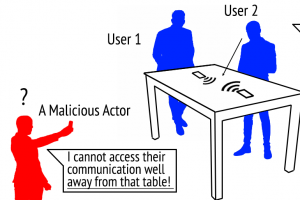Bluetooth requires device pairing to ensure security in data transmission, encumbering a number of ad-hoc, transactional interactions that require both ease-of-use and "good enough" security: e.g., sharing contact information or secure links to people nearby.
We introduce Bit Whisperer, an ad-hoc short-range wireless communication system that enables "walk up and share" data transmissions with "good enough" security. Bit Whisperer transmits data to proximate devices co-located on a solid surface through high frequency, inaudible acoustic signals. The physical surface has two benefits: it limits communication range since sound travels more robustly on a flat solid surface than air; and, it makes the domain of communication visible, helping users identify exactly with whom they are sharing data without prior pairing.
Through a series of technical evaluations, we demonstrate that Bit Whisperer is robust for common use-cases and secure against likely threats.
We also implement three example applications to demonstrate the utility of Whisperer: 1-to-1 local contact sharing, 1-to-N private link sharing to open a secure group chat, and 1-to-N local device authentication.

Security and privacy help realize the full potential of computing in society. Without authentication and encryption, for example, few would use digital wallets, social media or even e-mail. The struggle of security and privacy is to realize this potential without imposing too steep a cost. Yet, for the average non-expert, security and privacy are just that: costly, in terms of things like time, attention and social capital. More specifically, security and privacy tools are misaligned with core human drives: a pursuit of pleasure, social acceptance and hope, and a repudiation of pain, social rejection and fear. It is unsurprising, therefore, that for many people, security and privacy tools are begrudgingly tolerated if not altogether subverted. This cannot continue. As computing encompasses more of our lives, we are tasked with making increasingly more security and privacy decisions. Simultaneously, the cost of every breach is swelling. Today, a security breach might compromise sensitive data about our finances and schedules as well as deeply personal data about our health, communications, and interests. Tomorrow, as we enter the era of pervasive smart things, that breach might compromise access to our homes, vehicles and bodies.
We aim to empower end-users with novel security and privacy systems that connect core human drives with desired security outcomes. We do so by creating systems that mitigate pain, social rejection and fear, and that enhance feelings of hope, social acceptance and pleasure. Ultimately, the goal of the SPUD Lab is to design new, more user-friendly systems that encourage better end-user security and privacy behaviors.



